北师大版(2019)必修 第二册Unit 5 Humans and nature Lesson 2 Professional Rescue Team—Listening-课件(20张))
文档属性
| 名称 | 北师大版(2019)必修 第二册Unit 5 Humans and nature Lesson 2 Professional Rescue Team—Listening-课件(20张)) |
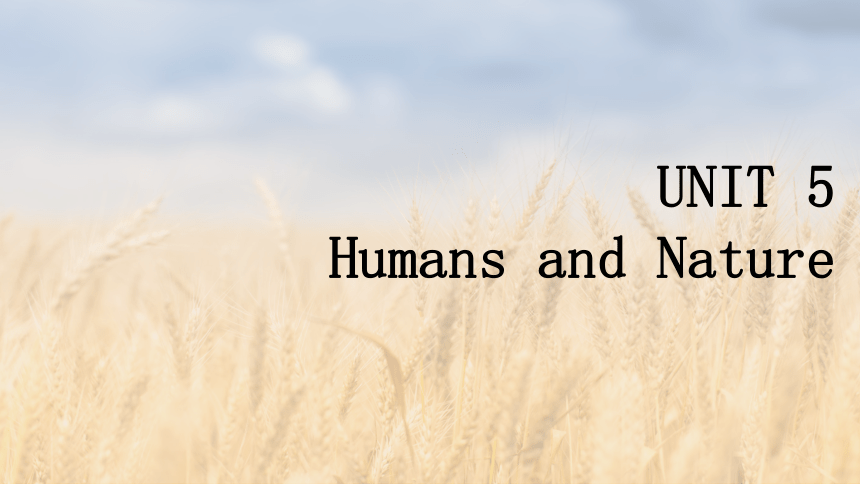
|
|
| 格式 | pptx | ||
| 文件大小 | 22.3MB | ||
| 资源类型 | 教案 | ||
| 版本资源 | 北师大版(2019) | ||
| 科目 | 英语 | ||
| 更新时间 | 2023-05-21 10:16:46 | ||
图片预览

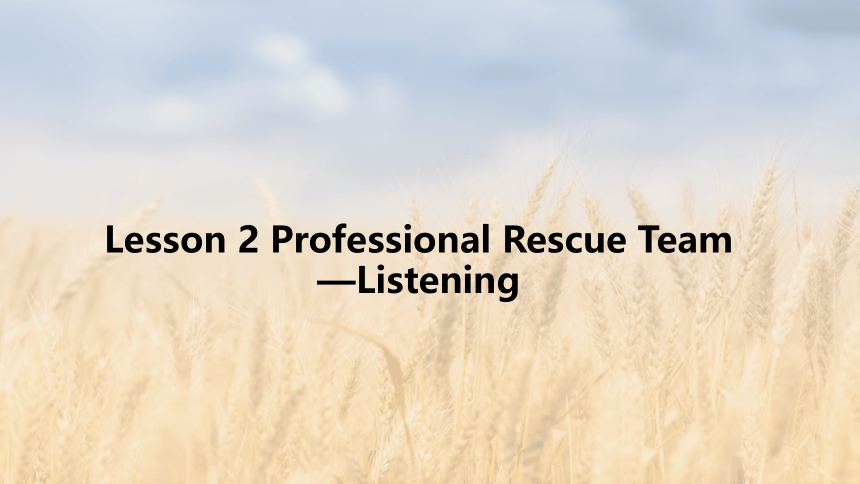
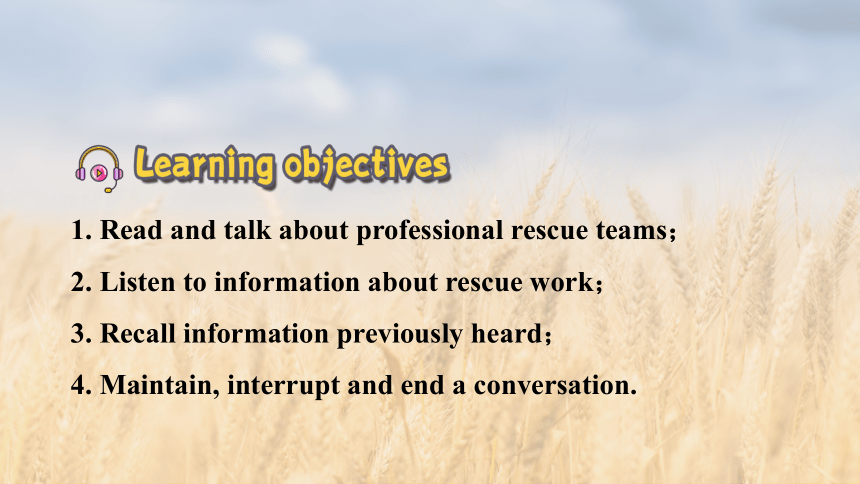
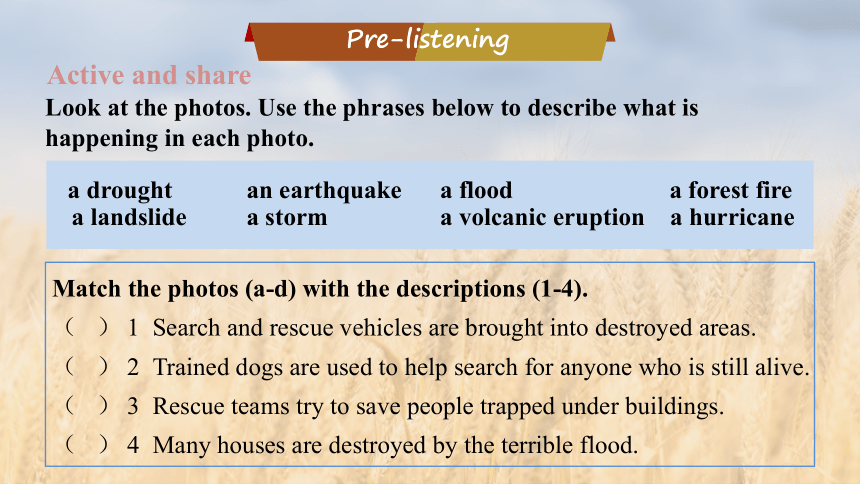
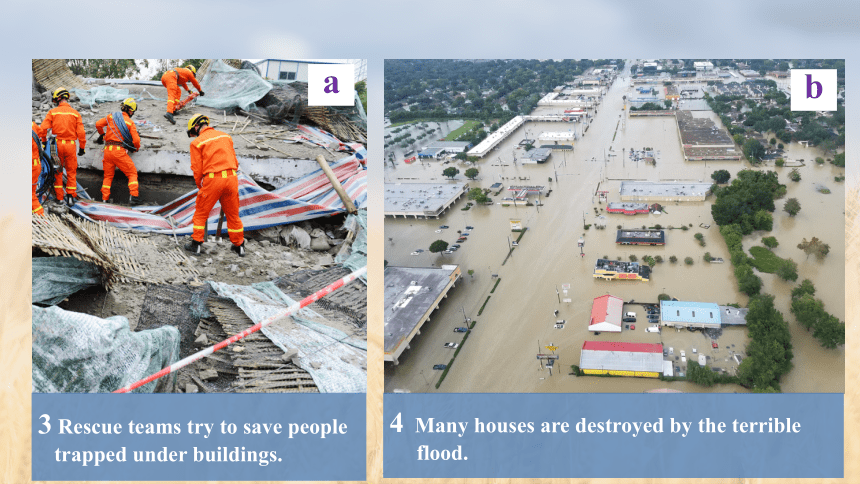
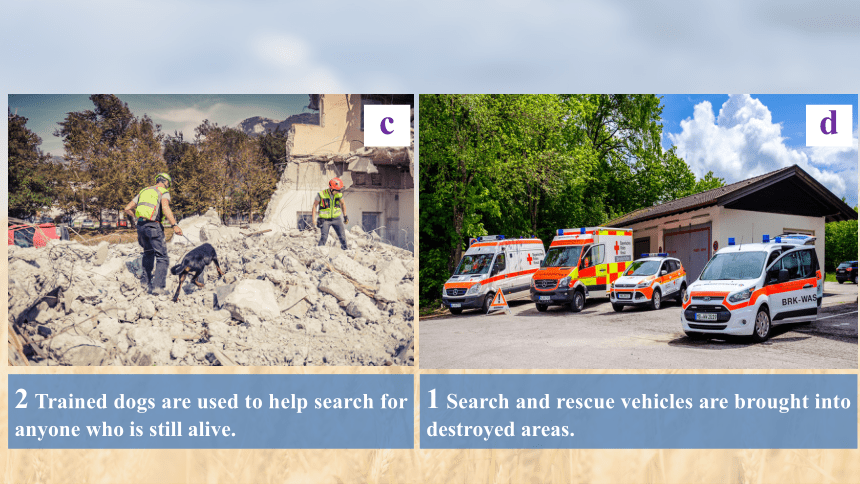
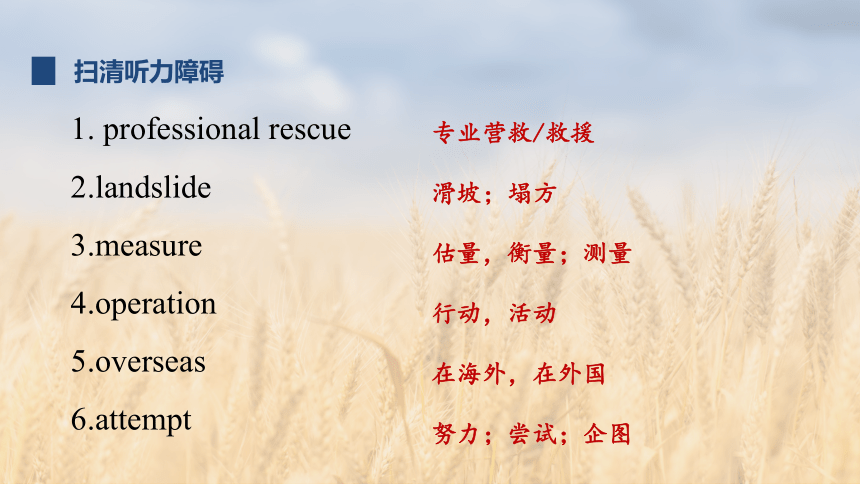
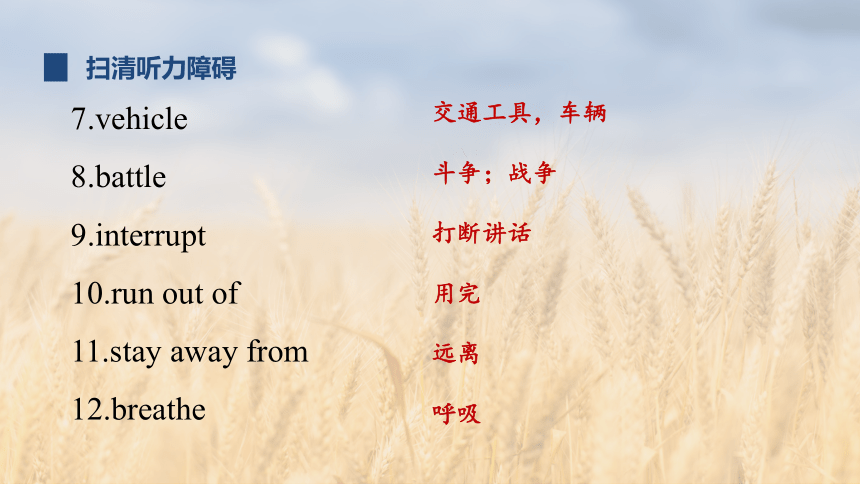

文档简介
(共24张PPT)
UNIT 5
Humans and Nature
Lesson 2 Professional Rescue Team
—Listening
1. Read and talk about professional rescue teams;
2. Listen to information about rescue work;
3. Recall information previously heard;
4. Maintain, interrupt and end a conversation.
Active and share
Look at the photos. Use the phrases below to describe what is happening in each photo.
a drought an earthquake a flood a forest fire
a landslide a storm a volcanic eruption a hurricane
Match the photos (a-d) with the descriptions (1-4).
( ) 1 Search and rescue vehicles are brought into destroyed areas.
( ) 2 Trained dogs are used to help search for anyone who is still alive.
( ) 3 Rescue teams try to save people trapped under buildings.
( ) 4 Many houses are destroyed by the terrible flood.
Pre-listening
3 Rescue teams try to save people
trapped under buildings.
4 Many houses are destroyed by the terrible
flood.
a
b
2 Trained dogs are used to help search for anyone who is still alive.
1 Search and rescue vehicles are brought into destroyed areas.
c
d
扫清听力障碍
1. professional rescue
2.landslide
3.measure
4.operation
5.overseas
6.attempt
专业营救/救援
滑坡;塌方
估量,衡量;测量
行动,活动
在海外,在外国
努力;尝试;企图
扫清听力障碍
7.vehicle
8.battle
9.interrupt
10.run out of
11.stay away from
12.breathe
交通工具,车辆
斗争;战争
打断讲话
用完
远离
呼吸
Listen for Main Ideas and Details
Main ideas are the key points of a presentation or a talk. They are supported by details.
When you listen, pay close attention to the statement that is emphasised by the speaker (usually at the beginning and end of the talk). This is often the main idea.
Listen carefully for key words, phrases and ideas that are repeated. These will confirm the main idea.
Now listen for specific information that supports the main ideas, e.g. examples, causes, reasons, facts and descriptions. These are the details.
Skill Builder
Activity 1: Listen to the first part of the interview. Answer the questions.
1. What is the interview about
2. Who is the interviewee
3. Which two disasters are mentioned
It is abou what __________________________ do when a natural disaster happens.
professional rescue teams
Mr Wang, who is from China International Search and Rescue Team.
the Wenchuan earthquake, the Nepal earthquake
While-listening
Activity 2: Listen again. Complete the sentences. Then decide if the sentences contain a main idea (MI) about rescue attempts or a detail (D). Write the correct letter in the brackets.
Listen to the interview for further details.
1 Our first and most important goal is to __________. ( )
2 We use __________________ vehicles and _____________ to look for anyone who is still alive. ( )
3 In a rescue attempt during the Nepal earthquake:
Over ______ members and ____ dogs took part, and we were there for ______ days. ( )
We rescued ________ people and provided medical help to over _______ people. ( )
4 It’s our duty to try to reduce _________ and _____________. ( )
save lives
MI
search and rescue
trained dogs
D
sixty
six
twelve
D
two
2,000
D
suffering
the loss of life
MI
What happens on rescue attempts
Activity 3: Listen to the passage again and filling in the blanks.
(P = Presenter W = Mr Wang)
P: Today,we’re talking about professional teams who work in ___________________. As you know,natural disasters like earthquakes,floods and landslides can cause death and other loss and damage that is hard __________. So what do professional rescue teams do when a natural disaster happens Today,Mr Wang from China International Search and Rescue Team is here to tell us all about this.
W: Hello,everyone!
P: Mr Wang,I know you have been part of many ______________ overseas,as well as in China,for example the Wenchuan earthquake in 2008. So what happens on your rescue attempts
W: Well,in the rescue attempts our first and most important goal is to save lives,for example at an earthquake site. So we use search and rescue vehicles and trained dogs to look for anyone who is still alive and try our best to save them.
natural disaster rescue
to measure
rescue operations
P: Sounds like a very ________________.How long does a rescue attempt usually take
W: To give you an example,one of my recent attempts was the Nepal earthquake. Over sixty members and six dogs took part,and we were there for twelve days. We rescued two people and provided ________________ to over 2,000 people.
P: Twelve days! You rescued two people and helped 2,000! Hard to imagine. It must ___________________.
W: Yes. It was a battle against time.
P: Wow,I can’t imagine how much pressure you are under.
W: It’s definitely hard. But it’s our duty to try our best to reduce suffering and the loss of life. We’re trained to do so.
challenging process
medical help
have been really tough
Activity 4: Work out four questions you may ask according to the information you heard in Activity 3. Then ask and answer the questions.
1 What is the most important goal of search and rescue attempts
2 How do rescue teams search for people who might be alive
The first and most important goal is to save lives.
They use search and rescue vehicles and trained dogs to look for anyone who is still alive.
3 Who took part in the rescue attempt in Nepal after the earthquake
How many people did they help
4 What is Mr Wang’s attitude towards his job Support your answer with evidence from the interview.
Over sixty members and six dogs took part, and they were there for twelve days.
They rescued two people and provided medical help to over 2,000 people.
He is devoted to his duty.
It’s our duty to try our best to reduce suffering and the loss of life.
We’re trained to do so.
Activity 5: Listen to the second part of the interview. What advice does Mr Wang give about surviving an earthquake when you’re outdoors, indoors or trapped
Outdoors Indoors Trapped
____________________________ from any buildings of streetlights. _____________anything that can break or fall. ______________ to help people find you and __________ when someone is nearby.
Stay there and move away
Stay away from
Knock on a wall
only shout
Activity 6: Listen to the passage again and filling in the blanks.
(W = Mr Wang P = Presenter)
W: ...So,we feel proud of what we do...
P: Excuse me,Mr Wang,but can I interrupt you there You’ve told us a lot about how you ______________________,but could you please tell us more about protection For example,what should we do in an earthquake
W: Right. If you’re outdoors,stay there and move away from any buildings or streetlights. If you’re indoors,stay away from anything that can break or fall,like windows or lamps.
P: OK,if I’m outdoors,move away from any buildings or streetlights. If I’m indoors,stay away from anything that can break or fall. But what if I’m trapped Should I try to shout ___________ I can,or...
conduct rescue attempts
as loud as
W: Sorry,but my advice is to knock on a wall to help people find you and only shout when someone is nearby.
P: Sorry for interrupting again. But why so
W: This is because shouting can cause you to ___________ a dangerous amount of dust.
P: I didn’t know that—great advice! We’ve all learnt a lot today. Well,I’d love to know more,but,unfortunately,we’ve __________ time. So,I’m very sorry,but we’ll have to finish there. Thank you again,Mr Wang.
W: My pleasure.
breathe in
run out of
Maintaining, Interrupting and Ending a Conversation
1 Excuse me, Mr Wang, but can I interrupt you there ( )
2 OK, if I’m outdoor, ... ( )
3 Sorry, but my advice is to... ( )
4 Sorry for interruption again... ( )
5 Well, I’d love to know more, but, unfortunately, we’ve run out of time. ( )
6 So, I’m very sorry, but we’ll have to finish there. ( )
Talk Builder
I
M
I
Activity 7: Listen again. Decide whether the phrases in italics are used to : maintain (M), interrupt (I) or end (E) a conversation. Write the correct letter in the brackets.
I
E
E
What are polite ways to interrupt and end a conversation Can you find more expressions
Post-listening
Activity 8: Pair Work Practise maintaining, interrupting and ending a conversation in the following situations. Use the expressions in the Talk Builder to help you.
Situation 1: Two friends talking on the phone.
Friend 1: talking about his /her worries for the next day’s presentation
Friend 2: needs to end the conversation so as to catch a train
Situation 2: An English teacher and a student in an English class
English teacher: explaining how to use relative clauses
Student: needs to interrupt so as to ask a question
UNIT 5
Humans and Nature
Lesson 2 Professional Rescue Team
—Listening
1. Read and talk about professional rescue teams;
2. Listen to information about rescue work;
3. Recall information previously heard;
4. Maintain, interrupt and end a conversation.
Active and share
Look at the photos. Use the phrases below to describe what is happening in each photo.
a drought an earthquake a flood a forest fire
a landslide a storm a volcanic eruption a hurricane
Match the photos (a-d) with the descriptions (1-4).
( ) 1 Search and rescue vehicles are brought into destroyed areas.
( ) 2 Trained dogs are used to help search for anyone who is still alive.
( ) 3 Rescue teams try to save people trapped under buildings.
( ) 4 Many houses are destroyed by the terrible flood.
Pre-listening
3 Rescue teams try to save people
trapped under buildings.
4 Many houses are destroyed by the terrible
flood.
a
b
2 Trained dogs are used to help search for anyone who is still alive.
1 Search and rescue vehicles are brought into destroyed areas.
c
d
扫清听力障碍
1. professional rescue
2.landslide
3.measure
4.operation
5.overseas
6.attempt
专业营救/救援
滑坡;塌方
估量,衡量;测量
行动,活动
在海外,在外国
努力;尝试;企图
扫清听力障碍
7.vehicle
8.battle
9.interrupt
10.run out of
11.stay away from
12.breathe
交通工具,车辆
斗争;战争
打断讲话
用完
远离
呼吸
Listen for Main Ideas and Details
Main ideas are the key points of a presentation or a talk. They are supported by details.
When you listen, pay close attention to the statement that is emphasised by the speaker (usually at the beginning and end of the talk). This is often the main idea.
Listen carefully for key words, phrases and ideas that are repeated. These will confirm the main idea.
Now listen for specific information that supports the main ideas, e.g. examples, causes, reasons, facts and descriptions. These are the details.
Skill Builder
Activity 1: Listen to the first part of the interview. Answer the questions.
1. What is the interview about
2. Who is the interviewee
3. Which two disasters are mentioned
It is abou what __________________________ do when a natural disaster happens.
professional rescue teams
Mr Wang, who is from China International Search and Rescue Team.
the Wenchuan earthquake, the Nepal earthquake
While-listening
Activity 2: Listen again. Complete the sentences. Then decide if the sentences contain a main idea (MI) about rescue attempts or a detail (D). Write the correct letter in the brackets.
Listen to the interview for further details.
1 Our first and most important goal is to __________. ( )
2 We use __________________ vehicles and _____________ to look for anyone who is still alive. ( )
3 In a rescue attempt during the Nepal earthquake:
Over ______ members and ____ dogs took part, and we were there for ______ days. ( )
We rescued ________ people and provided medical help to over _______ people. ( )
4 It’s our duty to try to reduce _________ and _____________. ( )
save lives
MI
search and rescue
trained dogs
D
sixty
six
twelve
D
two
2,000
D
suffering
the loss of life
MI
What happens on rescue attempts
Activity 3: Listen to the passage again and filling in the blanks.
(P = Presenter W = Mr Wang)
P: Today,we’re talking about professional teams who work in ___________________. As you know,natural disasters like earthquakes,floods and landslides can cause death and other loss and damage that is hard __________. So what do professional rescue teams do when a natural disaster happens Today,Mr Wang from China International Search and Rescue Team is here to tell us all about this.
W: Hello,everyone!
P: Mr Wang,I know you have been part of many ______________ overseas,as well as in China,for example the Wenchuan earthquake in 2008. So what happens on your rescue attempts
W: Well,in the rescue attempts our first and most important goal is to save lives,for example at an earthquake site. So we use search and rescue vehicles and trained dogs to look for anyone who is still alive and try our best to save them.
natural disaster rescue
to measure
rescue operations
P: Sounds like a very ________________.How long does a rescue attempt usually take
W: To give you an example,one of my recent attempts was the Nepal earthquake. Over sixty members and six dogs took part,and we were there for twelve days. We rescued two people and provided ________________ to over 2,000 people.
P: Twelve days! You rescued two people and helped 2,000! Hard to imagine. It must ___________________.
W: Yes. It was a battle against time.
P: Wow,I can’t imagine how much pressure you are under.
W: It’s definitely hard. But it’s our duty to try our best to reduce suffering and the loss of life. We’re trained to do so.
challenging process
medical help
have been really tough
Activity 4: Work out four questions you may ask according to the information you heard in Activity 3. Then ask and answer the questions.
1 What is the most important goal of search and rescue attempts
2 How do rescue teams search for people who might be alive
The first and most important goal is to save lives.
They use search and rescue vehicles and trained dogs to look for anyone who is still alive.
3 Who took part in the rescue attempt in Nepal after the earthquake
How many people did they help
4 What is Mr Wang’s attitude towards his job Support your answer with evidence from the interview.
Over sixty members and six dogs took part, and they were there for twelve days.
They rescued two people and provided medical help to over 2,000 people.
He is devoted to his duty.
It’s our duty to try our best to reduce suffering and the loss of life.
We’re trained to do so.
Activity 5: Listen to the second part of the interview. What advice does Mr Wang give about surviving an earthquake when you’re outdoors, indoors or trapped
Outdoors Indoors Trapped
____________________________ from any buildings of streetlights. _____________anything that can break or fall. ______________ to help people find you and __________ when someone is nearby.
Stay there and move away
Stay away from
Knock on a wall
only shout
Activity 6: Listen to the passage again and filling in the blanks.
(W = Mr Wang P = Presenter)
W: ...So,we feel proud of what we do...
P: Excuse me,Mr Wang,but can I interrupt you there You’ve told us a lot about how you ______________________,but could you please tell us more about protection For example,what should we do in an earthquake
W: Right. If you’re outdoors,stay there and move away from any buildings or streetlights. If you’re indoors,stay away from anything that can break or fall,like windows or lamps.
P: OK,if I’m outdoors,move away from any buildings or streetlights. If I’m indoors,stay away from anything that can break or fall. But what if I’m trapped Should I try to shout ___________ I can,or...
conduct rescue attempts
as loud as
W: Sorry,but my advice is to knock on a wall to help people find you and only shout when someone is nearby.
P: Sorry for interrupting again. But why so
W: This is because shouting can cause you to ___________ a dangerous amount of dust.
P: I didn’t know that—great advice! We’ve all learnt a lot today. Well,I’d love to know more,but,unfortunately,we’ve __________ time. So,I’m very sorry,but we’ll have to finish there. Thank you again,Mr Wang.
W: My pleasure.
breathe in
run out of
Maintaining, Interrupting and Ending a Conversation
1 Excuse me, Mr Wang, but can I interrupt you there ( )
2 OK, if I’m outdoor, ... ( )
3 Sorry, but my advice is to... ( )
4 Sorry for interruption again... ( )
5 Well, I’d love to know more, but, unfortunately, we’ve run out of time. ( )
6 So, I’m very sorry, but we’ll have to finish there. ( )
Talk Builder
I
M
I
Activity 7: Listen again. Decide whether the phrases in italics are used to : maintain (M), interrupt (I) or end (E) a conversation. Write the correct letter in the brackets.
I
E
E
What are polite ways to interrupt and end a conversation Can you find more expressions
Post-listening
Activity 8: Pair Work Practise maintaining, interrupting and ending a conversation in the following situations. Use the expressions in the Talk Builder to help you.
Situation 1: Two friends talking on the phone.
Friend 1: talking about his /her worries for the next day’s presentation
Friend 2: needs to end the conversation so as to catch a train
Situation 2: An English teacher and a student in an English class
English teacher: explaining how to use relative clauses
Student: needs to interrupt so as to ask a question
同课章节目录
- Unit 4 Information technology
- Lesson 1 Avatars
- Lesson 2 Apps
- Lesson 3 Internet and Friendships
- Unit 5 Humans and nature
- Lesson 1 A Sea Story
- Lesson 2 Professional Rescue Team
- Lesson 3 Race to the Pole
- Unit 6 The admirable
- Lesson 1 A Medical Pioneer
- Lesson 2 History Makers
- Lesson 3 The Superhero Behind Superman
